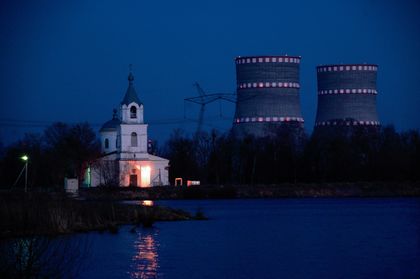On October 11, 2007, the State Duma (lower house of Russia’s parliament) approved in first reading a bill creating the Rosatom nuclear energy state corporation.
Rosatom should be established in the first quarter of 2008.
Organisation of the company is moving forward at a brisk pace, which experts believe is directly linked to Vladimir Putin’s initiatives.
In his latest state of the nation address to Russia’s parliament, he spoke of the need to establish “a special corporation to unite nuclear energy and industrial companies” that would also secure the country’s defence interests.
Usually, such large-scale projects are delayed by endless coordination with “the parties involved” at government sessions. This time, the president took precautions against such “practices” and personally submitted the document to the State Duma on October 4, which should guarantee its successful passage.
Oleg Morozov, State Duma first deputy speaker, said the draft law “will streamline the activity of a huge sector and create conditions for long-term strategic planning and programming.” First Deputy PrimeMinister Sergei Ivanov said Rosatom was an effective, vertically integrated structure capable of overhauling the Russian nuclear energy sector.
The corporation will have as its core the Rosatom Federal Atomic Energy Agency.
Its goal is to establish coordinated control of military, research, and civilian activities.
This is the first state corporation formed around an executive agency, not built from scratch or on the basis of a federal state unitary enterprise.
Rosatom is unique because it will receive a 100% stake in Atomenergoprom, a company that will incorporate all nuclear assets in the civilian sector, plus all assets in military federal state unitary enterprises and nuclear research institutes.
These include over 55 companies and organisations worth up to $50bn.
Until recently the Russian Federal Property Management Agency owned and controlled all state-owned assets. The law establishing Atomenergoprom allows Rosatom to own and control shares and assets of nuclear energy companies.
Viktor Zubkov also signed relevant instructions that focus on this indisputable right. All this will give the new organisation flexibility in market conditions, both in Russia and abroad.
As soon as the law on the state corporation is adopted, it will be allowed to sign contracts for three to five years, which is currently impossible due to numerous legislative restrictions.
The Rosatom legislation also regulates financial aspects. Like other new corporations, such as Rostekhnologii (Russian Technology), Rosnanotech (Russian Nanotechnology) and the VEB Development Bank, Rosatom will not be directly subordinated to the Russian government and will be financially independent. The draft bill specifies that the corporation will channel profits exclusively into programmes designed to achieve goals set by the law, namely into nuclear power generation, Russia’s defence capacities, and related research. The federal budget will finance the nuclear armaments sector, research and a part of the measures related to nuclear safety and security.
The government has allocated RUR18bn ($728.2mn,or€505.9mn) in2007under the federal target programme for developing Russia’s nuclear energy sector until 2015.
Ten billion roubles have already been invested.
First Deputy Prime Minister Sergei Ivanov said he had no doubts that the remaining RUR8bn would also be invested, as the establishment of the corporation moves forward.
Rosatom profits will be controlled by a supervisory council, the supreme executive body consisting of nine presidential and government officials, to be nominated by the prime minister and appointed by the Russian president. Analysts believe the council will be headed by Sergei Sobyanin, chief of the Kremlin administration. Sobyanin has experience in nuclear energy: he is board chairman at nuclear fuel producer TVEL, which handles the pelletting and production of fuel for nuclear power plants.
The draft bill establishing Rosatom does not regulate operation of the nuclear armaments sector and separates civilian and military components. Under the document, key material assets, such as fissilematerials and civilian units, can now be owned by both the government and legal entities. Foreigners are now also allowed to own imported or purchased fissile materials in Russia.
The number of legal entities with access to the nuclear sector will be strictly regulated in a list to be approved by presidential decree. The decree will be published as soon as the law on the state corporation is adopted. The list will prevent unauthorised companies from getting access to nuclear fuel and its production cycle.
Setting up such a huge company entails many difficulties. Experts say that for technical reasons it is difficult to divide military and civilian aspects: peaceful nuclear energy was created as an option to the military nuclear sector, with all technologies transferred from the military to the civilian sector, not vice versa. It is also difficult to integrate producers of equipment for nuclear power plants into Rosatom, because some of these companies are privately owned. However, a good beginning is half the battle, as the saying goes, and the beginning here holds great promise.













